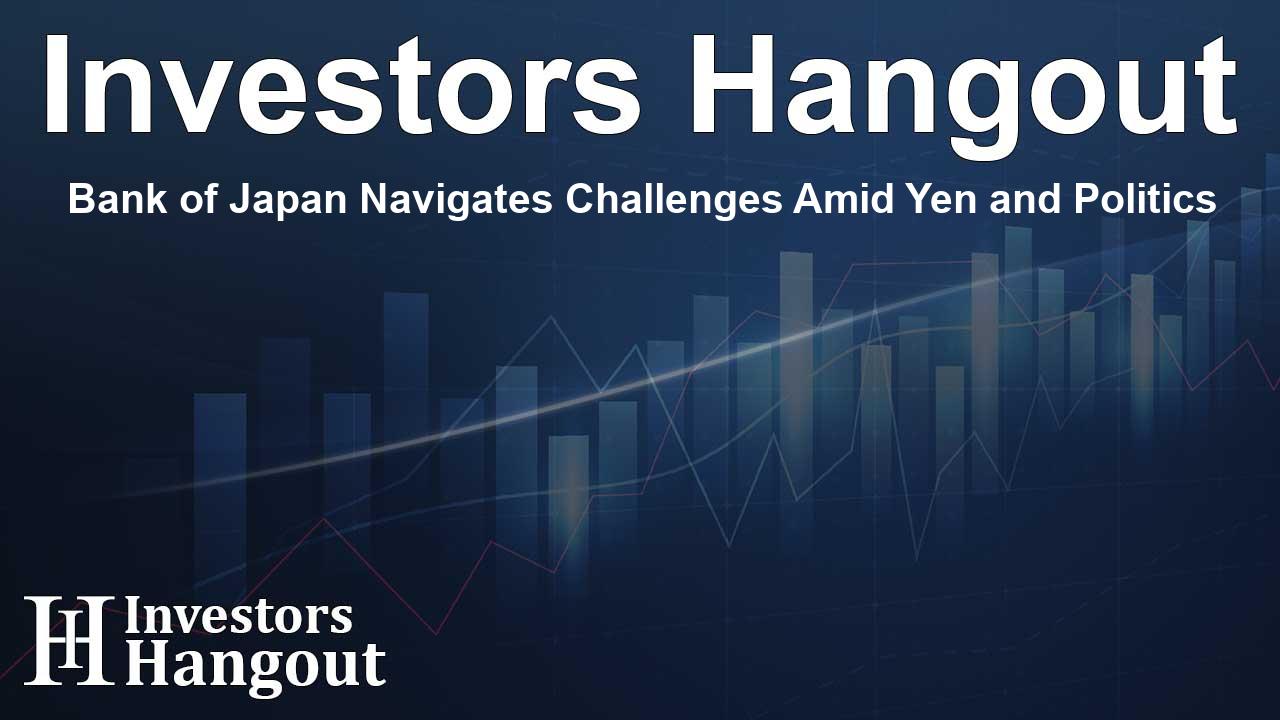Bank of Japan Navigates Challenges Amid Yen and Politics

Navigating Economic Challenges and Political Shifts
As the Bank of Japan (BOJ) attempts to normalize its monetary policy after years of ultra-low interest rates, it faces a new wave of complexities. A recent shift in political sentiment, combined with a yen rebound, presents a fresh set of hurdles for Governor Kazuo Ueda.
Political Landscape: A Dilemma for Rate Hikes
The recent remarks by Japanese Prime Minister Shigeru Ishiba have raised eyebrows across financial markets. His statement that the economy is unprepared for further rate hikes marks a stark change from his previous stance that supported the BOJ’s efforts to unwind years of monetary stimulus.
Impact on the Yen and Market Responses
These surprising comments have led to a devaluation of the yen against the dollar, intensifying uncertainty about how aggressively the BOJ will pursue tightening its monetary policy. Analysts suggest that while short-term political considerations might cloud the BOJ's strategy, the long-term vision remains intact.
Upcoming Elections and Economic Predictions
With a general election on the horizon, many experts predict that the BOJ will hold off on any immediate rate hikes during its meeting. The political backdrop becomes ever more crucial as the October election approaches, where economic stability will likely play a vital role.
The BOJ's Recent Decisions and Future Plans
Ueda’s appointment by former Prime Minister Fumio Kishida indicated a clear direction toward unwinding extreme monetary stimulus. The BOJ initiated its first rate hike in 17 years earlier this year, citing signs of an economy finally moving away from a persistent deflationary mindset.
Political Commitments to Economic Goals
However, Ishiba's cabinet has reiterated commitments to a 2013 policy statement focused on reflating Japan's stagnant economy, raising questions about the timing of further financial adjustments. Any major moves towards establishing higher interest rates will need to align with broader economic indicators and political stability.
The Balance of Risks: Domestic and International
As the BOJ navigates these turbulent waters, an essential consideration will be the implications of global economic trends, particularly in the U.S. A slowing U.S. economy could provide justification for the BOJ to delay more aggressive rate hikes, a view supported by various internal and external sources.
Communication Strategies and Policy Challenges
Clear communication from the BOJ is critical in minimizing confusion among market participants as the central bank adjusts its policy. BOJ board member Asahi Noguchi highlighted the need for better engagement with the marketplace to ensure that the BOJ’s intentions are transparent.
The Uncertainty of Future Leadership Decisions
With Ishiba’s approval ratings hovering around 50.7%, upcoming elections may have substantial implications for the BOJ's direction. Should Ishiba's administration face a significant challenge in maintaining its power, it could influence the pace and approach to monetary policy.
The Road Ahead: Rate Expectations
Looking ahead, if the political landscape stabilizes post-election, analysts could foresee a resumption in rate hikes as early as December or January. Conversely, political instability may hinder the BOJ's objectives of reaching a target rate around 0.75% over the following year.
Frequently Asked Questions
What challenges is the Bank of Japan facing?
The BOJ is grappling with political changes and a yen rebound that complicates its plans for rate hikes.
How has Prime Minister Ishiba influenced BOJ's decisions?
Ishiba's comments suggest a preference for maintaining low rates, impacting market expectations regarding forthcoming hikes.
What are analysts predicting for BOJ's rate strategies?
Experts believe the BOJ may pause rate hikes due to political uncertainties leading up to the election.
What economic indicators are influencing BOJ's policy?
Indicators such as inflation rates exceeding 2% and the stability of the labour market are critical in guiding BOJ's monetary policy.
How might international economics affect Japan?
Global trends, especially from the U.S., can influence Japan's economic strategy and the BOJ's decisions regarding interest rates.
About Investors Hangout
Investors Hangout is a leading online stock forum for financial discussion and learning, offering a wide range of free tools and resources. It draws in traders of all levels, who exchange market knowledge, investigate trading tactics, and keep an eye on industry developments in real time. Featuring financial articles, stock message boards, quotes, charts, company profiles, and live news updates. Through cooperative learning and a wealth of informational resources, it helps users from novices creating their first portfolios to experts honing their techniques. Join Investors Hangout today: https://investorshangout.com/
Disclaimer: The content of this article is solely for general informational purposes only; it does not represent legal, financial, or investment advice. Investors Hangout does not offer financial advice; the author is not a licensed financial advisor. Consult a qualified advisor before making any financial or investment decisions based on this article. The author's interpretation of publicly available data shapes the opinions presented here; as a result, they should not be taken as advice to purchase, sell, or hold any securities mentioned or any other investments. The author does not guarantee the accuracy, completeness, or timeliness of any material, providing it "as is." Information and market conditions may change; past performance is not indicative of future outcomes. If any of the material offered here is inaccurate, please contact us for corrections.